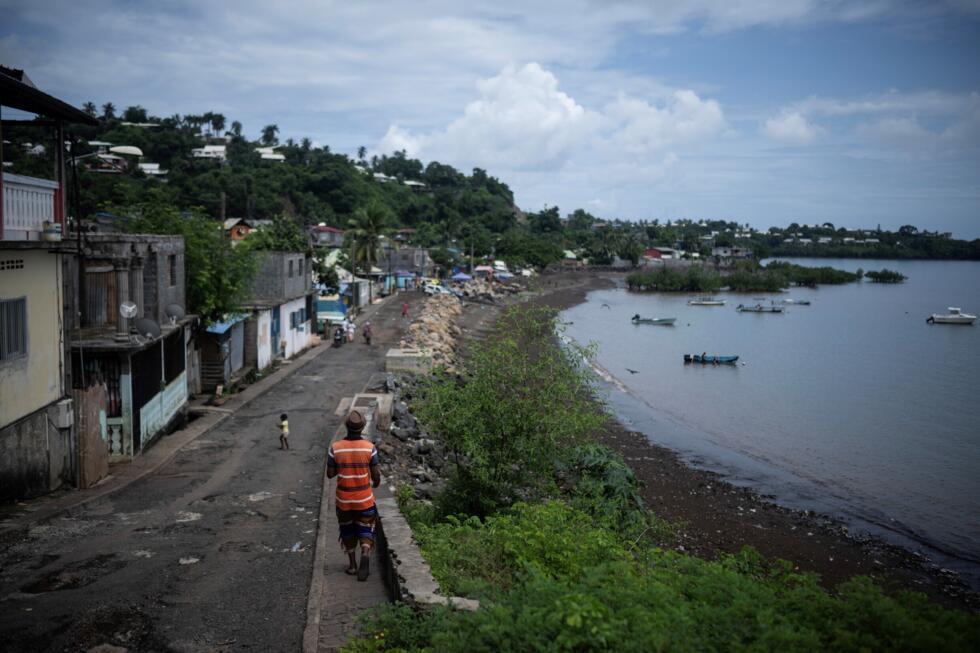Mayotte And France: Unpacking Centuries Of Colonial Arrogance

Table of Contents
The Early Years of French Colonization in Mayotte (1841-WWII): Establishing Control and Resistance.
Initial Conquest and the Imposition of French Rule:
The French colonization of Mayotte began in 1841, not through a grand invasion, but a gradual assertion of control. The initial conquest was met with significant resistance from the Mahorais population, who fiercely defended their autonomy and traditional ways of life. This resistance, though often fragmented, played a crucial role in shaping the early years of French rule.
- Examples of early resistance movements: Sporadic uprisings and revolts against French officials were common, often fueled by resentment over land seizures and the imposition of unfamiliar administrative structures.
- Key figures involved in the struggle against French rule: While specific names are often lost to history, oral accounts and fragmented records reveal the bravery of countless Mahorais individuals who challenged French authority.
- Initial administrative structures imposed by France: The French established a colonial administration that prioritized control and resource extraction, often neglecting the needs and aspirations of the local population. This initial framework laid the groundwork for decades of colonial rule.
Keywords: French colonization of Mayotte, Mahorais resistance, early colonial administration.
The Slow Integration and the Development of a Colonial System:
The slow integration of Mayotte into the French colonial system involved systematic economic exploitation and cultural suppression. The French administration implemented policies aimed at integrating the Mahorais population into French society, while simultaneously exploiting the island’s resources for economic gain.
- Key economic activities imposed by the French (e.g., agriculture, trade): The focus shifted towards cash crops like vanilla and cloves, often disrupting traditional agricultural practices and benefiting French traders more than the Mahorais people.
- Cultural policies designed to assimilate the Mahorais population: French language and culture were promoted at the expense of local traditions, impacting the preservation of Mahorais identity and cultural heritage.
- The role of the French administration in shaping society: The colonial administration controlled education, infrastructure development, and legal systems, all contributing to a system that reinforced French dominance and undermined local autonomy.
Keywords: Economic exploitation in Mayotte, cultural assimilation, French colonial policies in Mayotte, Mahorais identity.
Post-WWII Mayotte: Decolonization, Referendum, and the Ongoing Debate.
The Referendum of 1976 and its Consequences:
Following the independence of the Comoros archipelago, Mayotte held a controversial referendum in 1976. The decision to remain part of France was deeply contested, with lasting repercussions.
- Arguments for and against remaining with France: Pro-French factions emphasized economic stability and security, while opponents highlighted the ongoing infringement on Mahorais self-determination and the continuation of colonial inequalities.
- Participation rates in the referendum: The level of participation and the legitimacy of the results remain debated points in the historical record.
- The immediate reactions to the referendum result: The result was met with protests from the Comoros, which still considers Mayotte an integral part of its territory.
Keywords: Mayotte referendum 1976, Comoros independence, French overseas territory, self-determination in Mayotte.
Contemporary Issues and the Legacy of Colonialism:
The legacy of colonialism continues to shape contemporary challenges in Mayotte. Economic inequality, social tensions, and ongoing debates about identity and autonomy remain central concerns.
- Issues relating to immigration: The influx of immigrants from neighboring islands has created social and economic pressures.
- Economic disparities between Mayotte and metropolitan France: Significant economic disparities persist, raising questions about the benefits of remaining a French overseas department.
- Tensions between the Mahorais population and immigrants from neighboring islands: Competition for resources and opportunities has fueled social tensions.
- Ongoing calls for greater autonomy: Despite being a French overseas department, calls for greater autonomy and self-governance continue.
Keywords: Economic inequality in Mayotte, immigration to Mayotte, Mahorais identity politics, French overseas departments.
The Perspectives of the Mahorais People: Voices from the Island.
Narratives of Resistance and Resilience:
The history of Mayotte is not simply a narrative of colonial oppression; it's also a story of resistance and resilience. The Mahorais people have actively fought to preserve their culture and identity.
- Personal accounts of resistance: Oral histories reveal numerous instances of individual and collective resistance to French rule.
- Examples of cultural preservation: Despite pressures to assimilate, Mahorais culture has persisted through traditional practices, music, and language.
- The role of community organizations in maintaining Mahorais identity: Community organizations have played a critical role in cultural preservation and advocacy.
Keywords: Mahorais culture, oral histories, community resilience, cultural preservation in Mayotte.
Contemporary Mahorais Identity in a French Context:
The Mahorais identity is complex and multifaceted, shaped by centuries of interaction with French culture while maintaining distinct traditions.
- Examples of cultural hybridity: The blending of Mahorais and French traditions is evident in various aspects of daily life.
- Challenges of maintaining cultural traditions: The pressures of globalization and French cultural dominance pose significant challenges to the preservation of Mahorais heritage.
- The role of language in shaping identity: The use of Shimaore and French reflects the duality of Mahorais identity.
Keywords: Mahorais identity, Franco-Mahorais culture, linguistic diversity in Mayotte, cultural hybridity.
Conclusion:
The relationship between Mayotte and France is a complex tapestry woven from threads of colonization, resistance, and ongoing negotiation. The enduring impact of French colonialism shapes contemporary challenges, while the resilience of the Mahorais people remains a testament to their enduring spirit. A critical examination of the past is crucial to understanding the present and fostering a more equitable future. Continue the conversation about Mayotte and France; further explore the history of French colonialism in Mayotte and learn more about the ongoing challenges faced by the Mahorais people. Understanding the nuances of the relationship between Mayotte and France is vital for a more complete picture of the island’s past, present, and future.

Featured Posts
-
 Gigi Hadid Opens Up About Bradley Cooper A Rare Glimpse
May 05, 2025
Gigi Hadid Opens Up About Bradley Cooper A Rare Glimpse
May 05, 2025 -
 An In Depth Analysis Of The Count Of Monte Cristo
May 05, 2025
An In Depth Analysis Of The Count Of Monte Cristo
May 05, 2025 -
 Russell Westbrooks Rollercoaster Game 1 Nuggets Defeat Clippers
May 05, 2025
Russell Westbrooks Rollercoaster Game 1 Nuggets Defeat Clippers
May 05, 2025 -
 Dana White Confirms Alex Pereiras Heavyweight Shot Potential Jon Jones Super Fight At Ufc 313
May 05, 2025
Dana White Confirms Alex Pereiras Heavyweight Shot Potential Jon Jones Super Fight At Ufc 313
May 05, 2025 -
 Les Couleurs Du Temps By Cedric Klapisch A Successful Sale For Studiocanal At Cannes
May 05, 2025
Les Couleurs Du Temps By Cedric Klapisch A Successful Sale For Studiocanal At Cannes
May 05, 2025
